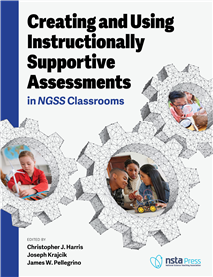All Resources
Journal Article
What other profession gives summers off, with the bonus of teaching in different locations? In this article I’ll tell how taking leaves of absence to teach at other locations was one of the opportunities that I enjoyed, which hopefully is available...
By Paul Hewitt
Journal Article
Generating opportunities: Strategies to elevate Science and Engineering Practices using ChatGPT
Within this Idea Bank, we offer practical strategies to integrate ChatGPT across three science and engineering practices (i.e., asking questions and defining problems, planning and carrying out investigations, and analyzing and interpreting data) dur...
By Andrew Kipp, Nathan Hawk, Gustavo Perez
Journal Article
This paper describes the design and implementation of a week-long engineering summer camp that engages pre-college learners in human-centered design principles. Students worked in teams of 3-5 to create and present a viable prototype for a specified ...
By Taylor Tucker, Saadeddine Shehab
Journal Article
The Science of Artificial Intelligence: An Introduction
Over the past few years, computer science education has expanded globally, including aspects of artificial intelligence (AI), especially in graduate and undergraduate education settings. However, less has been accomplished regarding how to introduce ...
By Sandy Watson
Journal Article
Just Because It Sounds Plausible, Doesn’t Mean It’s True
Plausible scientific arguments abound. Those who wish to deceive often weave a tangled web of plausible scientific arguments to support their case. What can the science teacher do to prevent their students being duped? Given that many of the claims a...
By Jonathan Osborne
Journal Article
Promoting Scientific Literacy through the Writing of Abstracts
Students are provided with plenty of opportunities to acquire new knowledge based on the various scientific disciplines they explore in their schooling. However, it can sometimes be difficult to integrate activities that build scientific literacy ami...
By Alexander Eden
Journal Article
Using Scenarios to Assess Student Learning
The Next Generation Science Standards (NGSS) define science literacy as having the knowledge and understanding of scientific concepts and processes and the ability to question natural world phenomena (National Research Council, 2012). When students w...
By Maha Kareem, Amy Lannin, William Romine, Nancy Singer, Marsha Tyson, Katie Kline, Michelle Kendrick, Sam Otten, Sarah Apple
Journal Article
Knowing the ABCs of Teaching in an Age of AI
Artificial Intelligence (AI) has taken the world by storm, consequently bringing a hurricane to the seas of education. The purpose of this article is to encapsulate commonly used classroom strategies into practices that can effectively build content...
By Tanya MacMartin
Journal Article
Establishing AI Literacy before Adopting AI
As applications of AI have proliferated, the call has grown for educating students about what AI is, how it works, and how it can affect us. In response, [an American University], in collaboration with an external implementation partner, developed 12...
By Fiona Hollands, Cynthia Breazeal
Journal Article
How do we as teachers balance the need of students to practice class content with their intense schedules, extracurriculars, and need for a healthy and balanced life? An alternative to traditional, mandatory homework is offered herein, in the form of...
By Lindsey Paricio-Moreau
Journal Article
Using Lessons from History to Guide the Implementation of AI in Science Education
It is critical to understand past science education reform to know what could be explored in the future (Cheng et al., 2010). The purpose of this position paper is to describe a historical timeline of science education. Using historical documents a...
By Aria Hadley-Hulet, Marc Ellis, Austin Moore, Emily Lehnardt, Max Longhurst
Journal Article
Metallurgical Engineer Wendi Cooksey
An interview with metallurgical engineer Wendi Cooksey...
By Luba Vangelova
Web Seminar
In this web seminar Heidi Harlan Allen, Executive VP, ECA Science Kit Services, will share all the secrets of successfully managing science materials in school districts. She will give a peek behind the scenes of their science materials kitting and r...
Journal Article
From Sun to Shade: Exploring Environmental Changes During the Total Solar Eclipse
Excitement is building in anticipation of the total solar eclipse taking place this April 2024. During the total solar eclipse, the moon will pass between the Earth and the Sun, blocking the Sun and casting a shadow on Earth. As the sky darkens, the ...
By Jill Nugent
Journal Article
We are now a decade past the release of the NGSS —an event that has shaped the way we teach science. The NGSS, with its three-dimensional approach encompassing disciplinary core ideas (DCIs), science and engineering practices (SEPs), and cross-cutt...
By Patricia McGinnis
Journal Article
Whole group discussions are a key aspect of the NGSS because these activities are where students collectively make sense of natural phenomena. However, curriculum can present all discussions as possessing the same instructional purpose and roles for ...
By Kevin Cherbow, Benjamin Lowell, Kris Grymonpre, Katherine McNeill, Renee Affolter
Journal Article
This article introduces the Data Puzzles instructional framework as a means to engage middle school students in the exploration of wind energy and its potential for future wind farm locations across the United States. By eliciting and leveraging stud...
By Jonathan Griffith, Melissa Braaten, Ann Dubick, Anne Gold
Journal Article
This article describes a cycle of teacher collaborative inquiry called the Student Experience Improvement Cycle (SEIC). The SEIC is a novel form of assessment: it focuses on supporting teachers in using evidence of the quality of student experience f...
By William Penuel, Ali Raza, Yamileth Salinas Del Val, Rosa Salinas-Estevez, Emily Williamson, Jennifer Smith, Quincy Gill
Journal Article
Standards-based grading (SBG) is an alternative approach to grading that uses standards, such as the NGSS, to communicate what students have learned. While SBG has increased in popularity in the last decade, questions still remain in regard to what c...
By Jesse Wilcox, Matt Townsley
Journal Article
Designing Performance-Based Assessments that Engage!
Rather than feel stressful for students, an assessment should feel like a celebration of learning. Performance-based assessments allow students to demonstrate their understanding of one or more standards by accomplishing tasks that are engaging and f...
By Katie Coppens
Journal Article
Socioscientific Modeling: Helping Students See Systems and Understand Messy Issues
In this article we present a strategy to help students unpack complex, socioscientific issues. We outline a 90-minute learning experience where students are asked to explore the complicated cause and effect relationships that shaped the course of the...
By Eric Kirk, Troy Sadler, Zhen Xu, Jamie Elsner, Li Ke, Laura Zangori, Rebecca Lesnefsky
Journal Article
Introducing Engineering Aims and Values through Rover Wheel Design
Engineering activities often emphasize the practices of engineers, but pay less attention to aspects of the nature of engineering. One important aspect of the nature of engineering is an understanding of the aims and values that underlie engineers’...
By Jerrid Kruse, Isaiah Kent-Schneider, Dan Chibnall, Sarah Voss, Emma Marie, Bridgid Miller, Jayme Scheck
Web Seminar
Explore the transformative impact of probeware technology through the latest research supporting its use. Learn how these tools enhance three-dimensional science teaching, deepen student engagement, and foster scientific understanding and critical th...
Journal Article
Transdisciplinary learning—where students develop and apply knowledge from multiple disciplines to solve open-ended problems—is necessary to prepare students for the most pressing real-world problems. Because transdisciplinary education often req...
By Anna DeJarnette, Stephanie Rollmann, Dieter Vanderelst, John Layne, Anna Hutchinson
Journal Article
Implementing Universal Design for Learning in the Higher Education Science Classroom
There is a growing need for college science faculty to teach a diverse group of learners. The Universal Design for Learning (UDL) framework can be used to create inclusive learning materials and activities in the higher education science classroom. A...
By Breanne Kirsch, Theodore Bryan, David Hoferer
Journal Article
Scaling Up: Lessons for Persuading Science Faculty to Adopt an Evidence-Based Intervention
The science education community is deeply vested in growing the next generation of scientists. One way to do this is through evidence-based interventions that support the motivation and performance of students in introductory classes. The literature...
By Jessi Smith, Dustin Thoman
Journal Article
Equitable instructor assessment changes amid COVID-19 pandemic
The coronavirus (COVID-19) outbreak mandated a rapid transition to online classes with little warning. Previous literature studying the effect of this sudden shift demonstrated enormous impacts on instructors and students. However, the details concer...
By Todd Lamb, Emily Driessen, Abby Beatty, Rachel Youngblood, Abby Esco, Sehoya Cotner, Catherine Creech, Abby Drake, Sheritta Fagbodun, Kristen Hobbs, Kelly Lane, Erin Larson, Sophie McCoy, Seth Thompson, Cissy Ballen
Journal Article
Student Self-Assessment of Exam Preparation in 100 and 200-Level Chemistry Courses
Student self-assessment surveys were utilized to look at student study habits in several areas. Both self-reported study time and study methods were explored. Surveys were given to students after receiving their graded exams. When compared to the ...
By Andrew Karatjas
Journal Article
The Influence of Learning Assistants on Faculty Use of Student-Centered Instruction
The Learning Assistant (LA) Program is a near-peer teaching model with three key components: 1) reevaluation of curriculum and lesson design to incorporate undergraduate LAs as a central part of the course, 2) a seminar attended by first-time LAs whe...
By Cameron Hill, Kathryn Spilios, Anthony Barrasso
Journal Article
Student advice for success in high structure science and engineering courses
High structure courses ask students to be active participants in the learning process with pre-class content acquisition and assessment, in-class active learning exercises, and after-class review assignments. While faculty may suggest certain strateg...
By Arik Ringsby, Justin Shaffer
Journal Article
Pedagogical approaches for supporting students’ argumentative writing in science laboratories have not been fully established. This paper examines the development of argumentative abilities in undergraduate students enrolled in chemistry laboratory...
By Ruomei Gao, Judith Weinstein-Lloyd, Jody Cardinal
Journal Article
Faculty at Massachusetts College of Pharmacy and Health Sciences (MCPHS University) recognized the potential benefits for collaborative teaching and learning across disciplines. Research and development of an “Interprofessional Case Learning Projec...
By Nalini Broadbelt, Nevila Jana, Katrina Van Dellen, Michelle Young, Kristen Petersen
Journal Article
Effective learning through a remote lab kit in an undergraduate invertebrate biology course
Active learning provides students with meaningful and introspective roles in education. However, it’s difficult to achieve in online class settings, particularly for biology laboratories initially designed to offer direct interactions with live org...
By Daniel Zarate, Kathleen Sheahan, Jingchun Li
Journal Article
Using Structured Academic Controversy for STEM Education Leadership Programs
As ethical issues involving computer technologies and social media become more common, there is increasing interest in what role ethics should play in Computer Science education. As a result, Computer Science departments worldwide have increased effo...
By Mariana Alvidrez, Christopher Villa, Elaine Hampton
Journal Article
Active learning is the new standard for teaching in higher education. As more faculty seek to expand their teaching practices by including active learning activities that promote higher levels of learning, many are doing so in small doses by temporar...
By William Beckerson, Jennifer Anderson, Siddhesh Kulkarni, John Perpich, Deborah Yoder-Himes
Journal Article
Disasterologists At The Movies: An Innovative Use of Twitter for Disaster Education
A common course activity used by emergency management faculty is the screening of Hollywood disaster films to provide students an opportunity to apply key disaster concepts learned in lecture. When college courses were abruptly moved online in 2020, ...
By John Carr, Samantha Montano, Jordan Titera, Amy Hyman




